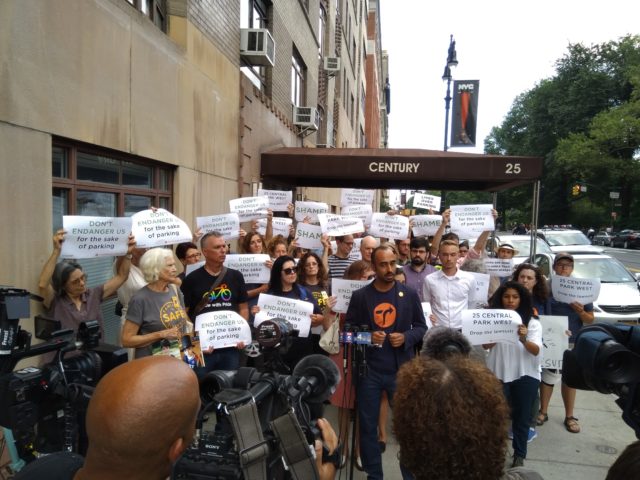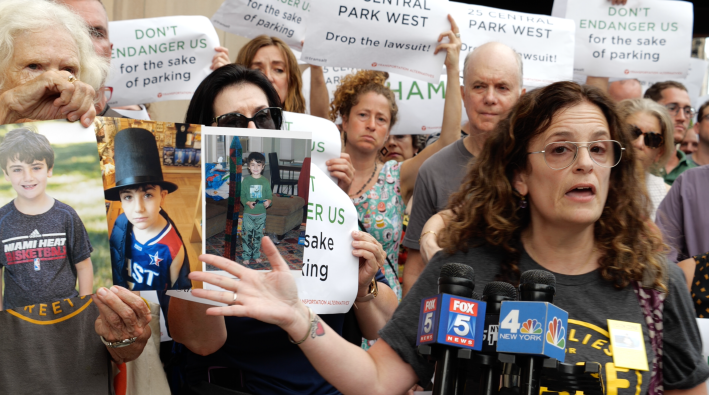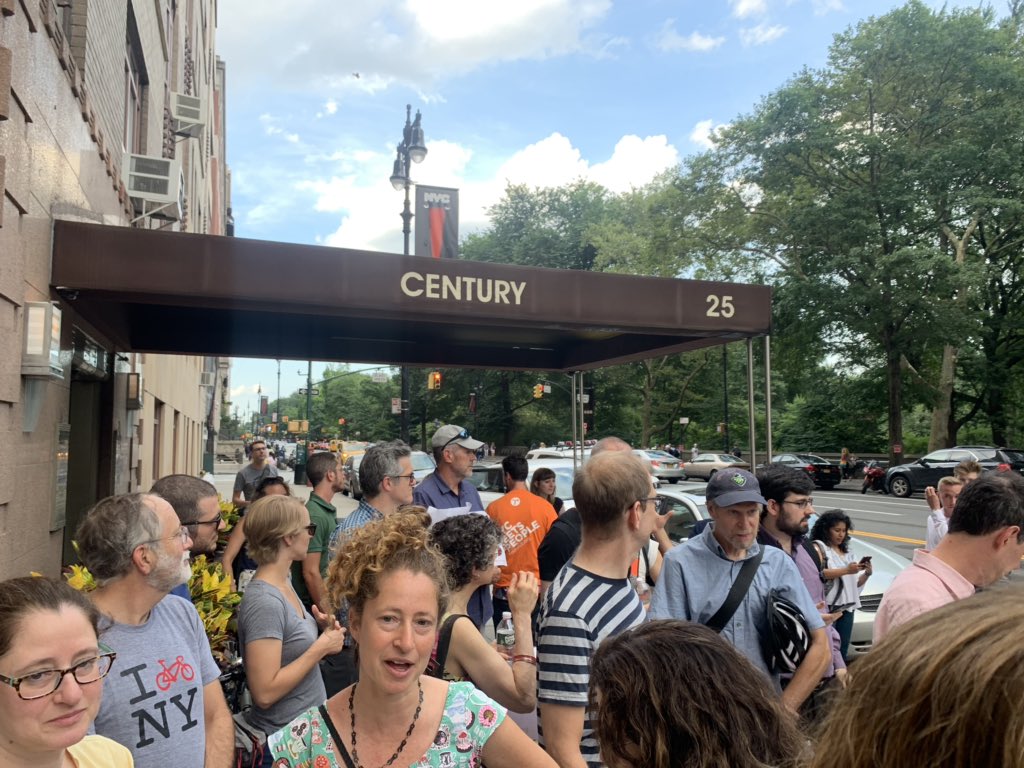Some of the wealthiest people in the city heard from some of the most frightened tonight as a few dozen cyclists and pedestrians rallied in front of a building whose residents have sued to stop the city from installing a life-saving bike lane on Central Park West on the grounds that it would remove 400 places for cars to be stored.
Residents of the Century Condominium — an uber-rich Art Deco tower where Jeff Bezos owns a unit and 71 percent of the households earn more than $150,00 per year — got an earful from supporters of the bike lane plan, who argued that lives are more important than convenience for car owners. The rally took place mere feet from where cyclist Madison Lyden was killed last summer after she was forced out of a painted lane and into traffic by a parked cab.
"She was killed because she did not have any protection," said Marco Conner, co-deputy director of Transportation Alternatives. "Over five years, 500 people have been injured on Central Park West just between 59th and 110th streets. ... Protected bike lanes reduce injuries for pedestrians. Protected bike lanes reduce injuries for motorists and cyclists."
Conner than asked the crowd, "Does parking save lives?"
Forty or so people screamed in unison, "No!"
"Shame," Conner continued. "Shame on the board of Century Condominium for putting our lives and the lives of other New Yorkers at risk."

Dana Lerner, whose son, Cooper Stock, was killed by a driver on nearby West End Avenue in 2014, made it personal:
"The day after my son's birthday, which we suffered through, we suffered through because he was killed, the next day, I heard that Madison had been killed," said Lerner. "This [lawsuit] is reprehensible. What is more important than saving a life? I cannot comprehend how the residents of this building have the gall. I beg the residents to come to their senses for the sake of the children who have died, for the sake of my beautiful son who is dead. Your life gets destroyed.
"There are too many cars in this city and too many reckless drivers," she added. "There are things that can be done. We cannot let these cars run this city and that's the same for parking spaces. Lives are important."
Residents of the building, including their lawyer Richard Leland, have declined to comment. A note left Tuesday for Bonnie Eisler, the lead plaintiff on the suit, was not answered. Doormen started refusing to take messages from the press for residents on Wednesday.
The residents of 25 Central Park West are among the richest in the city. According to the Census, 52 percent of the 388 households in the building earn more than $200,000 per year. How much more is unclear. Other Census data show that the average household income is $430,300. Yet despite that wealth, 68 percent of households do not own a car.

Yet the loss of parking was a key point raised in the condo board's lawsuit against the city, which says it will repurpose 400 curbside spaces to create the one-way northbound bike lane. The lawsuit argues that the bike lane is so disruptive a project that it requires a full environmental impact statement. But other environmental lawyers and advocates thought that argument was bunk.
"We cannot allow the manipulation of our environmental laws to stymie sustainable policies or initiatives," said Adriana Espinoza of the League of Conservation Voters. "This lawsuit is frankly senseless and dangerous — it can set a very dangerous legal precedent that could stymie many other initiatives to make cyclists and pedestrians more safe and make our buses run more efficient and get us to the future sustainable city we need."
Dana Lerner ripping into Century Condominium for abusing the courts and threatening the safety of New Yorkers for the sake of parking spaces. @NYC_SafeStreets @TransAlt @patkiernan @StreetsblogNYC @dahvnyc @ClaytonGuse @jangelooff @shubasu pic.twitter.com/I4k0RdBa0y
— Thomas DeVito (@PedestrianTom) August 1, 2019
Many onlookers agreed that a protected bike lane would be better than the existing painted lane, which is all too often a parking lane for cabbies and truckers.
“It would be a good thing not only for the bikers, but also for the pedestrians, to have a clear designation," said Rohan, who declined to give his surname. "The way it stands today, there’s often cars driving into the bike lane which forces the biker out into the street. ... When it comes to something that’s about public safety the building should care. There are so many people biking."
One resident of the building identified himself as a driver who favors parking over the bike lane.
“The tenants have the right to have their vehicles close to where they live, because it is not right that they have to park their cars three blocks away," said Jhovanny Padua German.
But even he admitted that he was asking for a major taxpayer-financed entitlement for the super-rich.
"But this is also a wealthy building, so we can just pay for parking," he said.






